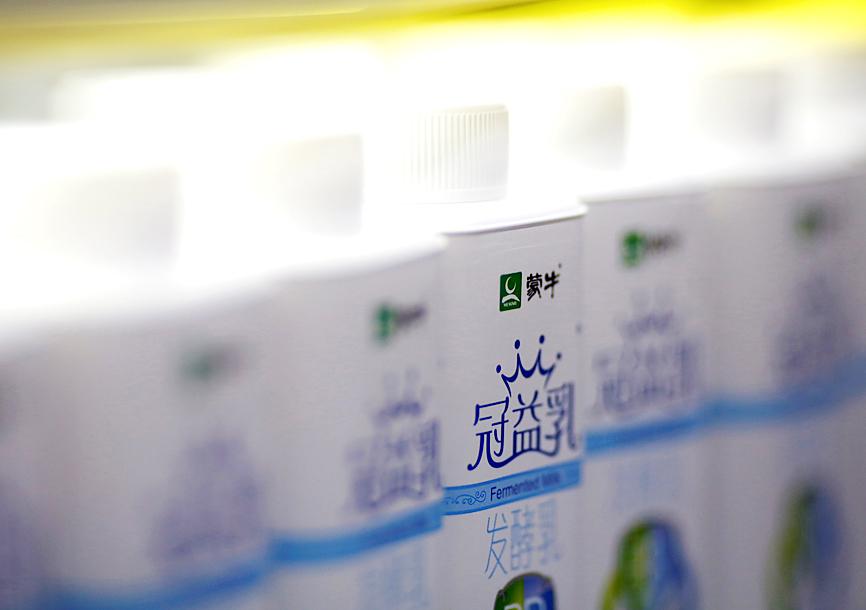Australia’s government might block China Mengniu Dairy Co’s (中國蒙牛乳業) purchase of some of the country’s best-known milk brands, the Australian Financial Review reported yesterday, citing sources who blamed “diplomatic issues.”
Australian Treasurer Josh Frydenberg has gone against the advice of the Foreign Investment Review Board (FIRB), which was in favor of approving the A$600 million (US$430.98 million) deal, the newspaper said, without identifying its sources.
That would mark the first government veto since Australia last month announced its biggest shake-up of foreign investment law in almost half a century.

Photo: Reuters
That gave the treasurer last-resort power to vary or impose conditions on deals even after FIRB approval, or force divestment in the event of a national security risk.
The revision came partly in response to fear that the economic impact of the COVID-19 pandemic would make buying strategic assets easier for cashed-up foreigners.
The law does not mention any specific country of origin.
However, China Mengniu’s approach came against a backdrop of increasing Sino-Australia tension after Canberra called for an international inquiry into the origins of the novel coronavirus, which was first reported in China at the end of last year.
China Mengniu offered to buy Lion Dairy & Drinks Pty from Japan’s Kirin Holdings Co in November last year, just 10 days after receiving the competition regulator’s approval to buy infant formula maker Bellamy’s for A$1.43 billion.
It gained antitrust approval for the Lion deal in February.
“The government does not comment on the details of foreign investment screening arrangements as they apply, or could apply, to particular cases,” Frydenberg said in an e-mailed response to questions about the report.
A spokesman for Kirin said: “We have heard nothing is decided, so we cannot comment based on speculation.”
A spokeswoman for China Mengniu did not immediately respond to requests for comment.
China Mengniu’s Hong Kong-listed shares were down 3.1 percent yesterday in a broader market that was down 2.1 percent.
Kirin shares were down 0.4 percent in Tokyo versus a 1 percent fall in the benchmark index.
Diplomatic relations between Australia and China soured further in May, when Canberra joined Western peers in criticizing a security law that Beijing imposed on Hong Kong.
That came after Beijing imposed import tariffs on Australian barley and suspended some beef imports.
In June, it advised Chinese students and tourists to avoid travelling to Australia, citing racial discrimination.
On Tuesday, the Chinese Ministry of Commerce announced an anti-dumping probe into imports of Australian wine.
Chinese investment to Australia more than halved last year to US$2.4 billion, and the number of deals is likely to keep falling this year due to the diplomatic tension as well as the pandemic, bankers said.
“The cooling of relations has a fairly large impact,” said a banker that advises on international mergers and acquisitions, requesting anonymity because of the sensitivity of the issue.
The banker said Chinese investors were still interested in Australian assets, but were practical enough to understand the current difficulties were driven by politics.

Merida Industry Co (美利達) has seen signs of recovery in the US and European markets this year, as customers are gradually depleting their inventories, the bicycle maker told shareholders yesterday. Given robust growth in new orders at its Taiwanese factory, coupled with its subsidiaries’ improving performance, Merida said it remains confident about the bicycle market’s prospects and expects steady growth in its core business this year. CAUTION ON CHINA However, the company must handle the Chinese market with great caution, as sales of road bikes there have declined significantly, affecting its revenue and profitability, Merida said in a statement, adding that it would

i Gasoline and diesel prices at fuel stations are this week to rise NT$0.1 per liter, as tensions in the Middle East pushed crude oil prices higher last week, CPC Corp, Taiwan (台灣中油) and Formosa Petrochemical Corp (台塑石化) said yesterday. International crude oil prices last week rose for the third consecutive week due to an escalating conflict between Israel and Iran, as the market is concerned that the situation in the Middle East might affect crude oil supply, CPC and Formosa said in separate statements. Front-month Brent crude oil futures — the international oil benchmark — rose 3.75 percent to settle at US$77.01

RISING: Strong exports, and life insurance companies’ efforts to manage currency risks indicates the NT dollar would eventually pass the 29 level, an expert said The New Taiwan dollar yesterday rallied to its strongest in three years amid inflows to the nation’s stock market and broad-based weakness in the US dollar. Exporter sales of the US currency and a repatriation of funds from local asset managers also played a role, said two traders, who asked not to be identified as they were not authorized to speak publicly. State-owned banks were seen buying the greenback yesterday, but only at a moderate scale, the traders said. The local currency gained 0.77 percent, outperforming almost all of its Asian peers, to close at NT$29.165 per US dollar in Taipei trading yesterday. The

RECORD LOW: Global firms’ increased inventories, tariff disputes not yet impacting Taiwan and new graduates not yet entering the market contributed to the decrease Taiwan’s unemployment rate last month dropped to 3.3 percent, the lowest for the month in 25 years, as strong exports and resilient domestic demand boosted hiring across various sectors, the Directorate-General of Budget, Accounting and Statistics (DGBAS) said yesterday. After seasonal adjustments, the jobless rate eased to 3.34 percent, the best performance in 24 years, suggesting a stable labor market, although a mild increase is expected with the graduation season from this month through August, the statistics agency said. “Potential shocks from tariff disputes between the US and China have yet to affect Taiwan’s job market,” Census Department Deputy Director Tan Wen-ling